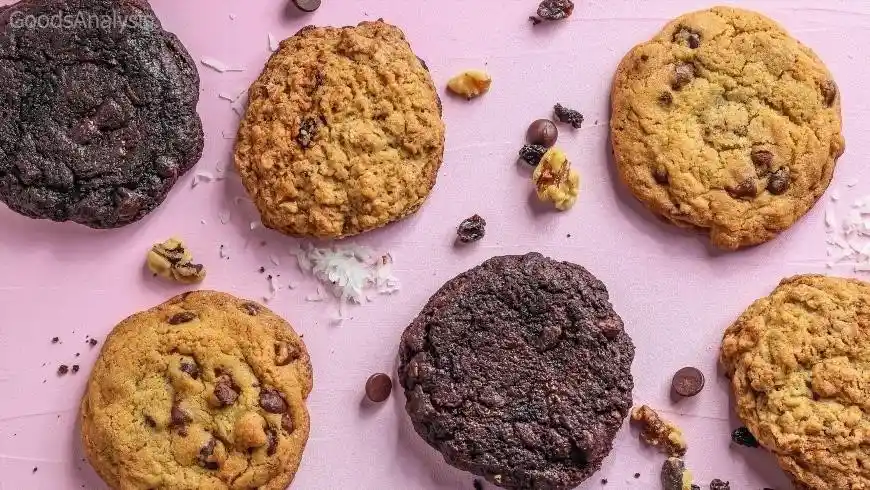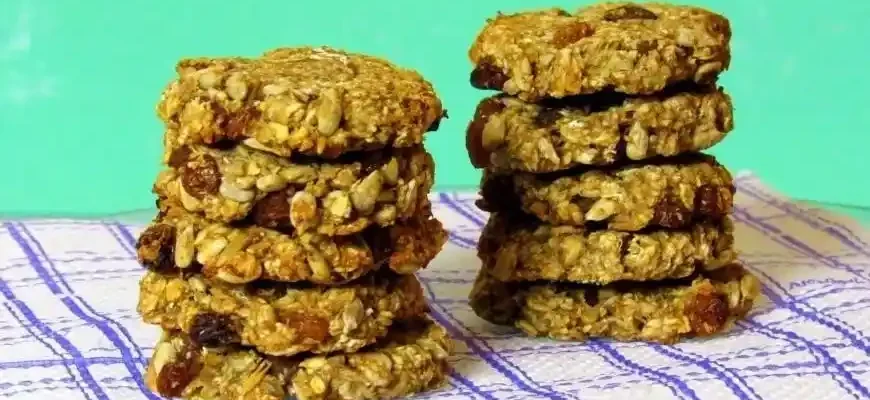Vegan cookies. The very thought of them may conjure images of bland, cardboard-like treats, which are often either too healthy for their own good or lacking the delightful sweetness of their dairy-laden cousins. But I’m here to tell you—vegan cookies can be delicious. In fact, when done right, they can be just as indulgent and satisfying as the traditional butter-and-egg versions, without sacrificing taste or texture. Let’s break it all down.
Why Go Vegan with Your Cookies?
First off, why should we care about making vegan cookies? The reasons vary, but I’ll touch on a few key ones:
- Health Benefits: Vegan cookies can be lower in saturated fat and cholesterol, especially if you swap butter for healthier oils or fats like coconut oil or olive oil. They’re also often higher in fiber when made with whole grains like oats or almond flour.
- Animal Welfare: For those concerned with animal rights, vegan cookies eliminate the use of animal products like eggs, butter, and milk. By making a simple switch, you’re opting for a cruelty-free treat.
- Environmental Impact: Animal agriculture is a significant contributor to climate change. The production of plant-based foods generally has a smaller environmental footprint compared to the farming of animals. So, vegan cookies can be a small but impactful step toward a more sustainable lifestyle.
- Dietary Restrictions: Vegan cookies cater to various dietary restrictions. They’re often suitable for those with lactose intolerance, egg allergies, or those following a vegan or plant-based diet.
But, before you dive into baking, it’s important to understand that not all vegan cookies are created equal. Like everything in the culinary world, there are some pitfalls to avoid.
The Ingredients You’ll Need
Making vegan cookies requires a little knowledge of what can replace the usual animal products. But fear not—I’ll guide you through it.
1. Egg Replacers
Eggs are commonly used in baking to provide structure and binding. Luckily, there are several plant-based options that do the job:
- Flaxseed Meal: Mix 1 tablespoon of ground flaxseeds with 3 tablespoons of water and let it sit for 5 minutes. This forms a gel-like consistency that mimics the binding action of eggs.
- Aquafaba: The liquid from canned chickpeas is a magical egg substitute. You can use about 3 tablespoons of aquafaba for every egg.
- Applesauce: While it doesn’t quite bind like eggs, applesauce can add moisture to your cookies, particularly in softer, chewy varieties.
2. Butter Substitutes
Butter provides richness, moisture, and flavor. Here’s how you can replace it:
- Vegan Butter: The easiest substitute is vegan butter, which is widely available in grocery stores.
- Coconut Oil: This is a great alternative that imparts a subtle coconut flavor. Just make sure it’s solidified before using it in your cookie recipe.
- Olive Oil: Works well, especially in savory vegan cookies. It’s best in cookies with ingredients like rosemary or lemon.

3. Milk Alternatives
You can’t have cookies without a little milk! But don’t worry, there are plenty of plant-based milks that do the job just fine:
- Almond Milk: One of the most popular vegan milk options. It’s a great all-purpose choice for most cookie recipes.
- Oat Milk: Slightly sweeter and thicker than almond milk, oat milk is a fantastic choice for cookies that you want to have a fuller, richer texture.
- Soy Milk: Another versatile option that mimics cow’s milk quite well, making it an easy swap for most recipes.
4. Sweeteners
Not all sweeteners are vegan, so make sure the sugar you use hasn’t been processed with bone char (which is used to whiten traditional sugar). Here are some vegan-friendly options:
- Coconut Sugar: This is a lower-glycemic sweetener that adds a rich, caramel-like flavor to cookies.
- Maple Syrup: Adds moisture along with sweetness, making it perfect for chewy cookies.
- Agave Syrup: A sweeter alternative to maple syrup, though it may be a bit thinner.
5. Flour
For most vegan cookie recipes, you’ll want to stick with regular all-purpose flour or whole wheat flour. If you want to make them gluten-free, you can substitute with almond flour, oat flour, or a gluten-free flour blend, though these may affect the texture slightly.
How to Make Vegan Cookies: The Basics
Making vegan cookies is not much different from traditional cookie-making—just a few ingredient swaps. Here’s a simple step-by-step guide to get you started:
Ingredients:
- 1 cup of flour (all-purpose or whole wheat)
- 1/2 cup of coconut oil or vegan butter
- 1/4 cup of coconut sugar or maple syrup
- 1 flax egg (1 tablespoon ground flaxseed + 3 tablespoons water)
- 1/2 teaspoon baking soda
- 1/4 teaspoon salt
- 1/2 cup of dairy-free chocolate chips (optional)
Directions:

- Preheat your oven to 350°F (175°C) and line a baking sheet with parchment paper.
- Prepare the flax egg: In a small bowl, mix the ground flaxseed with water. Let it sit for a few minutes to thicken.
- Mix wet ingredients: In a large mixing bowl, combine the coconut oil (or vegan butter) and coconut sugar (or maple syrup). Beat together until smooth. Add the flax egg and vanilla extract, and mix well.
- Combine dry ingredients: In a separate bowl, whisk together the flour, baking soda, and salt.
- Combine wet and dry ingredients: Gradually add the dry ingredients into the wet mixture, stirring until everything is fully incorporated. Fold in chocolate chips if you like.
- Shape the dough: Scoop tablespoon-sized portions of dough and roll them into balls. Place them on the prepared baking sheet, spacing them about 2 inches apart.
- Bake: Bake for 8-10 minutes, or until the edges are golden. Let the cookies cool on the baking sheet for a few minutes before transferring them to a wire rack.
The Common Pitfalls and How to Solve Them
- Dry or Crumbly Cookies: If your cookies turn out too dry or crumbly, you may have over-mixed the dough or used too much flour. Try reducing the flour a little or adding a tablespoon more liquid (like almond milk or maple syrup).
- Flat Cookies: If your cookies spread too much and end up flat, it could be that your dough was too warm when you put it on the baking sheet, or you didn’t use enough binding agents. Chill the dough for 30 minutes before baking to prevent spreading.
- Tough Cookies: Overworking the dough can cause cookies to turn out tough. Handle the dough gently and avoid over-mixing.
Different Perspectives on Vegan Cookies
To wrap up this article, let’s hear a few opinions from different folks around the world on vegan cookies:
- Sara, 28, USA: “I started baking vegan cookies when I went dairy-free. Honestly, I was shocked at how good they were. I love using coconut sugar because it adds a caramel flavor. My friends don’t even notice they’re vegan!”
- Carlos, 45, Spain: “I’ve always loved the traditional Spanish pastries, but I tried a vegan version recently, and I was surprised how well it turned out. Vegan baking is definitely worth exploring, even if you’re not a vegan yourself!”
- Anjali, 38, India: “In India, we have so many plant-based ingredients available, so making vegan cookies isn’t too difficult. I love adding cardamom and saffron to my cookies for a unique flavor twist.”
- Tobias, 56, Germany: “I’m not vegan, but I started making vegan cookies for a friend, and now I enjoy them more than regular cookies. They’re lighter and less greasy. My favorite part is that they don’t sit heavily in your stomach.”
- Yuki, 22, Japan: “Vegan cookies in Japan are a bit hard to find, so I learned how to bake them myself. They’re much healthier than the sugary ones I used to buy, and I feel good knowing I’m supporting animal rights too.”
Conclusion
Vegan cookies are a wonderful, versatile treat that can be as decadent as you want them to be. With the right ingredient swaps, you can create cookies that not only meet your dietary needs but also satisfy your taste buds. Whether you’re avoiding animal products, looking for healthier options, or just curious about new baking methods, vegan cookies are definitely worth exploring. So, go ahead—bake up a batch and treat yourself to something delicious (and ethical).









